Archive for May 2013
Why bias puts young gays' health at risk
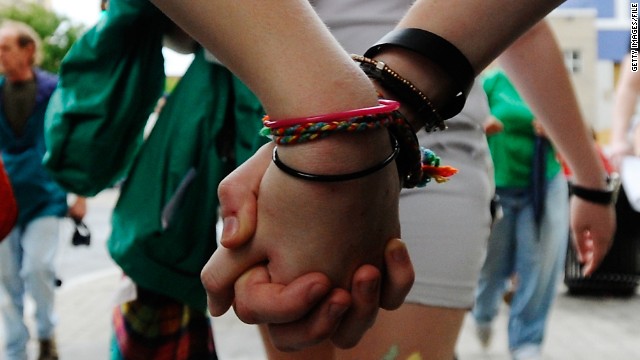
- Rob Stephenson: Boy Scouts allowing gay members a good step for health of gay youth
- He says studies show stigma drives gay youth to unhealthy behaviors with bad outcomes
- He says discrimination can cause depression, drug and alcohol use, risky sex
- Writer: Kids internalize harmful messages; gay youths receive many. We must make it better
Editor's note: Rob Stephenson is a Public Voices Fellow with the OpEd Project and associate professor of Global Health at Emory University.
(CNN) -- When I was 8, I joined the Boy Scouts. I lasted three weeks--couldn't get the hang of all that knot tying, and no one was interested in singing show tunes around the campfire. I was gay and I knew it. At that time, revealing my sexual identity would have resulted in my exclusion from Scouting. Until the Boy Scouts of America's historic May 23 vote -- which allows gay youth to join the scouts, but upholds the ban on gay adult leaders -- thousands of boys across the country faced similar discrimination from the Scouts, who actively and vocally banned gays.
The Scouts' decision to include gay youth is part of the sea change sweeping across the United States on the issue of gay equality, an issue that has long centered on equal rights for all. But discrimination, in the Boy Scouts as in every walk of life, brings with it another effect that is left out of the conversation on rights: poorer health.
Hiding one's sexual identity and being excluded from activities and social groups causes stress, and research shows this can have a significant impact on health. In her review of the health of gay youth, Tumaini Coker notes that gay youth are three times more likely to partake in substance abuse, and that adolescents who said they felt stigmatized -- for example, in the form of family rejection -- are five times more likely to experience depression.

Still, this is an area that, unfortunately, has not been well studied. On the rare occasions that this link is discussed, the academic community has tended to focus on adults. But the health effects on young people who are stigmatized is surely as significant.
My own recent research, published in the American Journal of Men's Health, drew on a sample of 1,000 gay men from Atlanta, and showed that gay men who reported that they heard statements such as "being gay is not normal" in their youth were more likely as adults to have unprotected sex and to have sex while intoxicated or high. The study is among the first to demonstrate associations between stigma induced stress in childhood and negative health behaviors as adults that put them at risk for HIV infection.
There is already ample evidence to suggest that adult gay men and women experience poorer health relative to straight people.
Opinion: Boy Scouts' decision makes no sense
For one thing, gay men have been more heavily affected by the AIDS epidemic than the general population. According to the Centers for Disease Control and Prevention, between 2006 and 2009, gay men -- and other men who have sex with men -- were the only risk group to experience an increase in HIV incidence. There also is a wealth of data showing that gay men and women are more likely to engage in smoking, alcohol and drug use, and experience poorer mental health.
 Alabama church asks Boy Scouts to leave
Alabama church asks Boy Scouts to leave  Boy Scouts will allow gay youth to join
Boy Scouts will allow gay youth to join A study of 577 gay adults by Sean McCabe and colleagues at the University of Michigan showed that gay adults who experience discrimination are nearly four times more likely to experience substance abuse disorders, while Diana Burgess and colleagues at the University of Minnesota noted that compared with heterosexuals, gay adults are 68% more likely to experience depression and 56% more likely to experience anxiety.
Ilan Meyer, a senior scholar at UCLA's School of Law, offers an explanation for these disparities through the "Theory of Minority Stress," which suggests that these health inequities may be rooted in discrimination, with negative health behaviors acting as coping mechanisms for repeated exposure to stigma-related stress.
Opinion: My take: Why my family is quitting the Boy Scouts
As impressionable children we internalize messages we receive about what is right, what is normal, what we are allowed to be -- each shaping our views about our sexual identity and whether we "belong." Being exposed to messages that same-sex relationships are not "normal" is damaging. These messages set scripts for youth to follow, divide them into normal and abnormal, and arm bullies with justification to harm them. As my own research shows, these messages have lasting impacts — sometimes fatal -- on health behaviors as adults.
The consequences for youth are painfully illustrated by the It Gets Better Project, created by writer Dan Savage in 2010 to give gay youth hope that life will be easier as a gay adult. Savage developed the project in response to the high rates of suicide among gay youth. Research indeed shows that gays are significantly more likely to attempt suicide compared with heterosexual youth (21.5% vs 4.2%), and that among gay youth, the risk of attempting suicide is 20% greater in unsupportive environments compared with supportive environments.
Being told we are different at an age when we are trying to establish who we are can be devastating. But what if it didn't have to get better? What if it could be better from the start?
Last week the Boy Scouts sent an important signal to gay youth: You are not different. But it is not quite enough. The ban on gay Scout leaders remains. Last week, Senate Judiciary Committee Chairman Patrick Leahy, D-Vermont, withdrew his proposed amendment to provide U.S. citizens the right to sponsor their same-sex partners for green cards.
And in June the Supreme Court will vote on the Defense of Marriage Act. Each inequity sends a message to young people that they can expect not to be treated equally when they grow up, setting them on the pathway to lowered self-esteem and poorer health. Perhaps it is time to examine how we are treating America's gay youth through that lens. By creating equality, we can create better health — right from the start.
Follow us on Twitter @CNNOpinion.
Join us on Facebook/CNNOpinion.
The opinions expressed in this commentary are solely those of Rob Stephenson.
Shakedown 'justice' in Mexico
- Ruben Navarrette: U.S. mother jailed in Mexico on drug charges is likely innocent
- He says funds to fight drugs in Mexico weren't meant to hold innocent people in jail
- Mexico is supposed to be beyond this kind of police and court corruption, he says
- Mexican president must intervene, he says; if he doesn't, secretary of state needs to
Editor's note: Ruben Navarrette is a CNN contributor and a nationally syndicated columnist with the Washington Post Writers Group. Follow him on Twitter: @rubennavarrette.
(CNN) -- I keep thinking of those television ads from the Mexican tourism industry urging Americans to "Come visit Mexico."
Visiting isn't difficult. For some Americans, it's leaving that's the problem.
For years, U.S. officials have urged their Mexican counterparts to get tough on drug traffickers. The Americans even provided $1.4 billion through the Merida Initiative to help our friends south of the border accomplish that goal.
Yet, the drama unfolding in the state of Sonora -- just across the border from Arizona -- can't be what U.S. officials had in mind.
The idea was to help Mexico's police and military pursue violent criminals -- the sort who terrorize people by scattering human heads like party favors on the dance floors of nightclubs -- not to prey on Americans held for ransom by crooked cops looking for their next payday.
And that's what appears to be driving the story of Yanira Maldonado, a 42-year-old U.S. citizen who sits in a women's prison in Nogales, Mexico, on what seem to be bogus drug charges. Maldonado -- who is Mormon, and has seven children, and two grandchildren -- is represented by a Mexican attorney. We don't know for sure what happened. But if Yanira is innocent of these charges, which is the most likely scenario given that the Mexican authorities have no evidence of her guilt, she must be released immediately.
Meanwhile, the U.S. State Department is monitoring the situation and providing the family with updates.

 Yanira Maldonado speaks out from jail
Yanira Maldonado speaks out from jail  Was mom jailed in Mexico framed?
Was mom jailed in Mexico framed? The family's nightmare began last week when the Mexican-born Yanira and her husband, Gary, boarded a bus to head back to the United States after attending her aunt's funeral in Mexico.
That was their first mistake. Those of us who visit Mexico know you never get on a bus. It makes you easy pickings for bandits and bad cops, and sometimes you can't tell the difference. Bandits might take your money, and let you go on your way. Bad cops take your liberty, and hold it until someone back home sends enough money to let you go on your way.
Either way, it's not personal. It's just a business transaction. But it's a cruel and ugly business.
Anyway, back to the bus. It came up to a military checkpoint -- which might as well be a toll booth -- and everyone was taken off the bus as soldiers boarded it.
"I was at the checkpoint, asked to get off bus," Yanira told CNN from prison. "They were checking for drugs and I don't know what else. They say they found something under the seat but I never saw anything. They didn't show me anything. It was amazing all what they did."
The soldiers claim that they found a package containing 12.5 pounds (5.7 kilograms) of what appeared to be marijuana under Yanira's seat. And so they placed her under arrest, and handed the case over to the Mexican attorney general's office for prosecution.
Maybe the authorities are telling the truth. Or maybe the drugs were there before she ever sat down. Or maybe the soldiers put the drugs there. Or maybe there were no drugs. No one knows, because, conveniently, the only people on the bus were the soldiers.
Whatever happened, it seems unlikely that a woman could have carried a package weighing over 12 pounds onto a bus and slipped it under her seat without being noticed.
Gary Maldonado has said that he and his wife checked their bags, and boarded with no luggage.
He also says that when his wife was taken into custody, one of the soldiers told him matter-of-factly that it would cost him $5,000 to get her released. Later, according to family members, he was quoted the same price by civilian authorities -- $5,000 -- for her release, whether she was found guilty or not.
That's how it works. Think of it as a processing fee.
In Mexico, stories like this one -- which are all about money, and corruption, and how predatory some hungry people can be when they catch a glimpse of a piece of bread -- are as common as pinatas and margaritas.
But that's not supposed to be the case anymore.
I was in Mexico City in November on a mission sponsored by the American Jewish Committee. We met with top officials, including President Enrique Pena Nieto, and the message could not have been clearer. "With a booming economy, less crime in metropolitan areas, and the reins of power now back in the hands of the Institutional Revolutionary Party, the country is open for business. This is the new Mexico."
Sorry folks, it seems there are still unseemly remnants of the old Mexico, and they are threatening to undermine the makeover.
The Maldonados probably aren't thinking about the relationship between the United States and Mexico at the moment. They just want a wife and mother to come home to her family.
With luck, Yanira Maldonado will be released on Friday. Her family will pay the fee as ordered, and she will be free to go. And this ugly chapter, in their lives and in the U.S.-Mexico relationship, will be closed.
But if that doesn't happen, on Saturday, Pena Nieto needs to intervene. And if he concludes that Yanira is innocent, he needs to order her release. And if he doesn't, Secretary of State John Kerry needs to fly to Nogales and wait there until he does.
Incidentally, Mexico is still waiting on the last few hundred million dollars in drug fighting funds promised under the Merida Initiative.
Congress should send the rest of the money. Minus $5,000. That should go to the Maldonado family, if and when Yanira is found innocent. Think of it as a processing fee.
Follow us on Twitter @CNNOpinion.
Join us on Facebook/CNNOpinion.
The opinions expressed in this commentary are solely those of Ruben Navarrette.
Meet the new spelling bee champ
- Arvind Mahankali had twice finished in third place
- Winner correctly spells "tokonoma" then "knaidel"
- Prize package includes $32,500 in cash and savings bonds
(CNN) -- Arvind Mahankali, a 13-year-old eighth-grader from Bayside Hills, New York, won the Scripps National Spelling Bee on Thursday, correctly spelling the word "knaidel."
"It means that I am retiring on a good note," said Mahankali, who attends Nathaniel Hawthorne Middle School 74 and was in his last year of eligibility. "I shall spend the summer, maybe the entire day, studying physics."
Mahankali, who wants to become a physicist, had finished third in the two previous national bees, being eliminated after misspelling words with German roots.
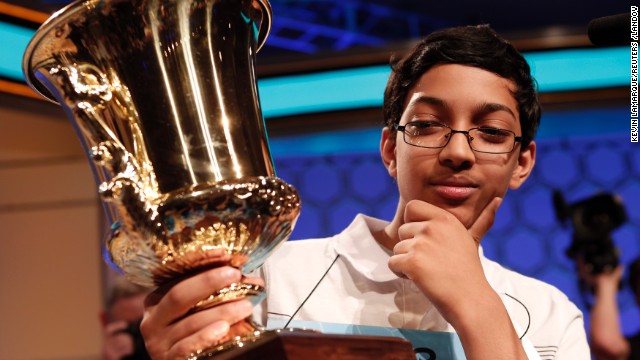 Arvind Mahankali, a 13-year-old from Bayside Hills, New York, won the Scripps National Spelling Bee, spelling "knaidel," a dumpling, on May 30. Definitions for the words spelled were taken from Merriam-Webster. Take a look back at previous winners.
Arvind Mahankali, a 13-year-old from Bayside Hills, New York, won the Scripps National Spelling Bee, spelling "knaidel," a dumpling, on May 30. Definitions for the words spelled were taken from Merriam-Webster. Take a look back at previous winners.  Confetti falls on Mahankali after he won the bee.
Confetti falls on Mahankali after he won the bee. 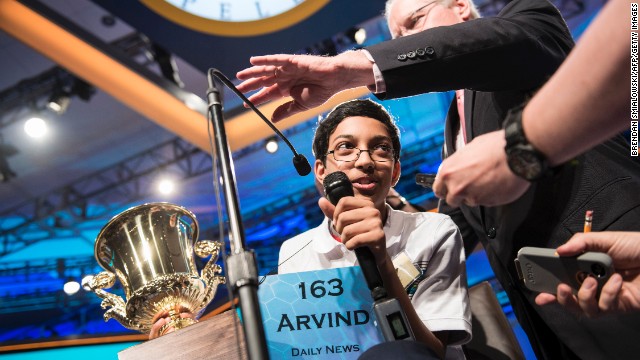 Mahankali holds his trophy while speaking to reporters after his victory.
Mahankali holds his trophy while speaking to reporters after his victory. 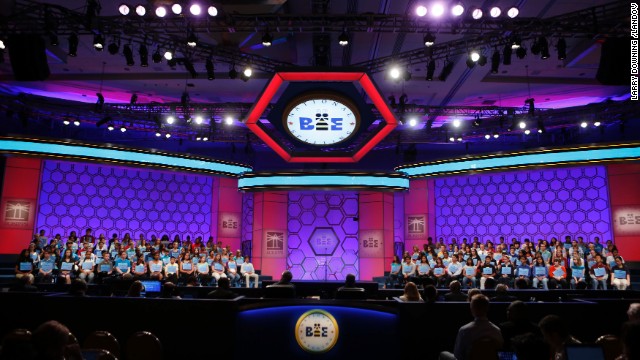 The contest started with 281 contestants from eight nations, narrowed down to 11 spellers for the championship round. This year brought a new challenge for the contestants. For the first time, the bee instituted vocabulary tests during the first and fourth rounds. The competition took place at Gaylord National Resort and Convention Center in National Harbor, Maryland.
The contest started with 281 contestants from eight nations, narrowed down to 11 spellers for the championship round. This year brought a new challenge for the contestants. For the first time, the bee instituted vocabulary tests during the first and fourth rounds. The competition took place at Gaylord National Resort and Convention Center in National Harbor, Maryland. 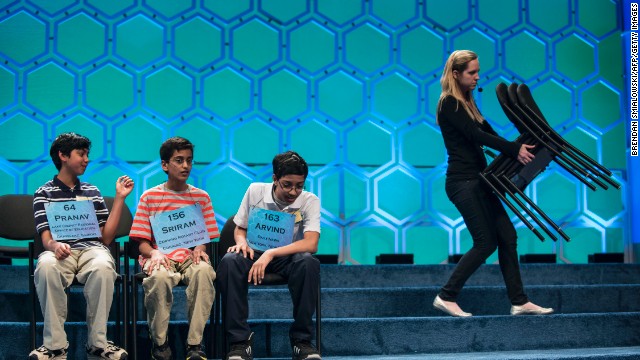 The final three competitors, Pranav Sivakuma, left, Sriram J. Hathwar, center, and Arvind V. Mahankali chat as former competitors' chairs are removed from the stage.
The final three competitors, Pranav Sivakuma, left, Sriram J. Hathwar, center, and Arvind V. Mahankali chat as former competitors' chairs are removed from the stage. 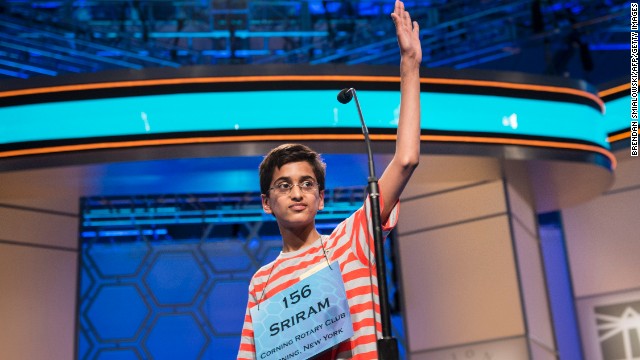 Sriram J. Hathwar, representing New York, waves goodbye after misspelling "ptyalagogue," during the championship round on May 30.
Sriram J. Hathwar, representing New York, waves goodbye after misspelling "ptyalagogue," during the championship round on May 30. 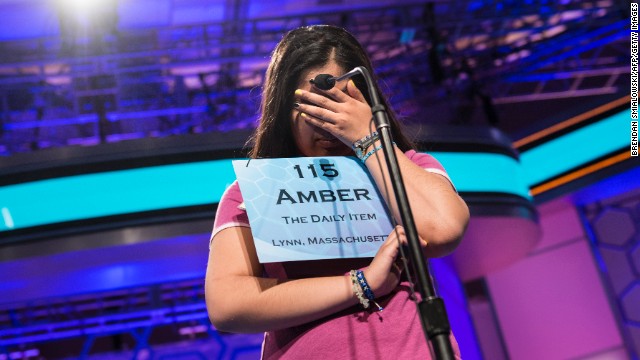 Amber Born, representing Massachusetts, misspelled "hallali," a huntsman's bugle call, during the championship round on May 30.
Amber Born, representing Massachusetts, misspelled "hallali," a huntsman's bugle call, during the championship round on May 30.  Vismaya J. Kharkar, representing Utah, was eliminated from the championship round on May 30, after mispelling "paryphodrome," which describes leaf venation that has a vein that closely follows the margin.
Vismaya J. Kharkar, representing Utah, was eliminated from the championship round on May 30, after mispelling "paryphodrome," which describes leaf venation that has a vein that closely follows the margin.  Syamantak Payra, representing Texas, was eliminated during the champtionship round when he mispelled "cipollino," a light-colored Roman marble, on May 30.
Syamantak Payra, representing Texas, was eliminated during the champtionship round when he mispelled "cipollino," a light-colored Roman marble, on May 30. 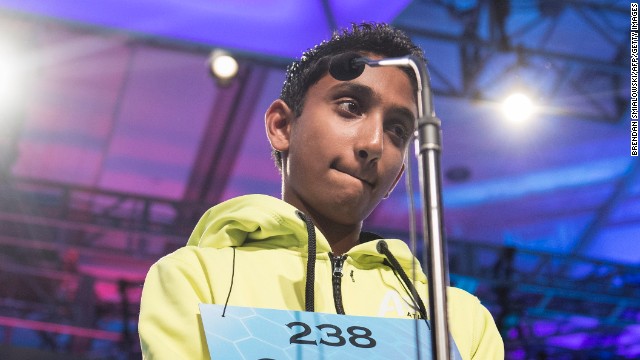 Chetan G. Reddy, representing Texas, reacts after misspelling "kaburi," a land crab common to mangrove swamps, during the championship round on May 30.
Chetan G. Reddy, representing Texas, reacts after misspelling "kaburi," a land crab common to mangrove swamps, during the championship round on May 30.  Finalists line up after being announced ahead of the final round on Thursday, May 30. Only 11 contestants will compete in the final.
Finalists line up after being announced ahead of the final round on Thursday, May 30. Only 11 contestants will compete in the final. 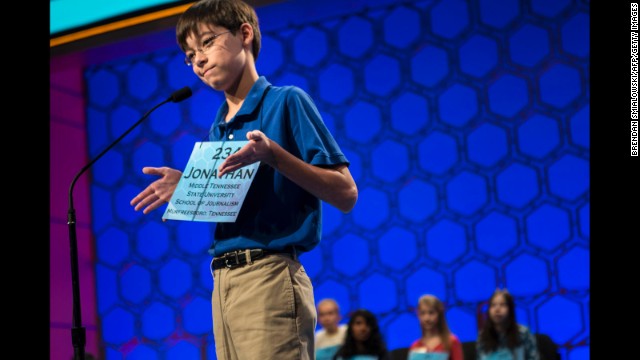 Jonathan Caldwell, representing Tennessee, reacts to misspelling "pergameneous," meaning to resemble parchment, in the sixth round on May 30.
Jonathan Caldwell, representing Tennessee, reacts to misspelling "pergameneous," meaning to resemble parchment, in the sixth round on May 30. 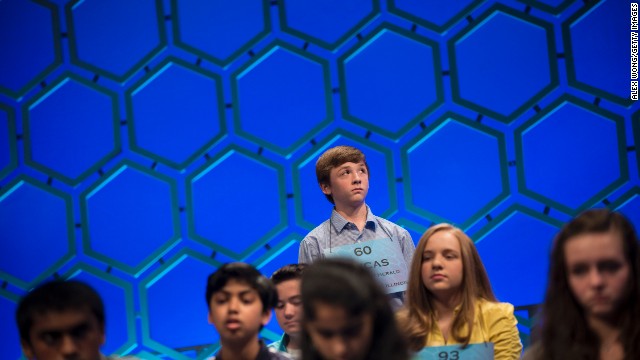 Lucas Michael Urbanski, from Illinois, waits to compete during the semifinals on Thursday, May 30. Urbanski spelled "parvanimity," the state of having a little or ignoble mind, in round five.
Lucas Michael Urbanski, from Illinois, waits to compete during the semifinals on Thursday, May 30. Urbanski spelled "parvanimity," the state of having a little or ignoble mind, in round five.  Amber Born of Marblehead, Massachusetts, celebrates after she spells "pediculicide," an agent for destroying lice, in round five on May 30.
Amber Born of Marblehead, Massachusetts, celebrates after she spells "pediculicide," an agent for destroying lice, in round five on May 30.  Joseph Kirkpatrick, from Indiana, reacts after misspelling "ignimbrite," a hard rock formed from volcanic ash, in the fifth round on May 30.
Joseph Kirkpatrick, from Indiana, reacts after misspelling "ignimbrite," a hard rock formed from volcanic ash, in the fifth round on May 30. 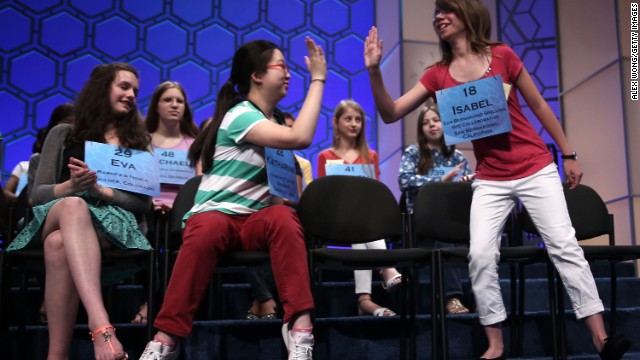 Isabel Cholbi, right, of San Bernardina, California, celebrates after spelling "telergy," in round five on May 30. Telergy is the hypothetical action of one person's thoughts and desires on the brain of a different person via an unknown form of energy transmission.
Isabel Cholbi, right, of San Bernardina, California, celebrates after spelling "telergy," in round five on May 30. Telergy is the hypothetical action of one person's thoughts and desires on the brain of a different person via an unknown form of energy transmission. 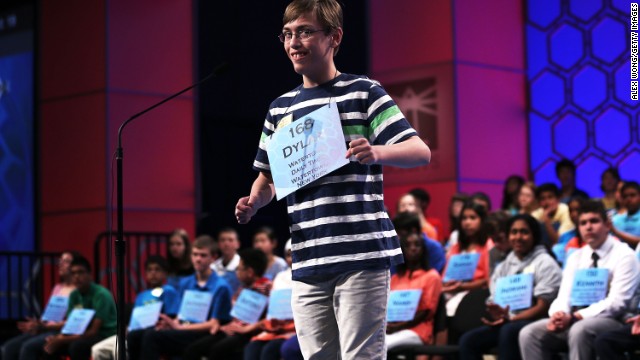 Dylan O'Connor of Alexandria Bay, New York, smiles after spelling "acervation," which means a heaping up, in round three on Wednesday, May 29.
Dylan O'Connor of Alexandria Bay, New York, smiles after spelling "acervation," which means a heaping up, in round three on Wednesday, May 29. 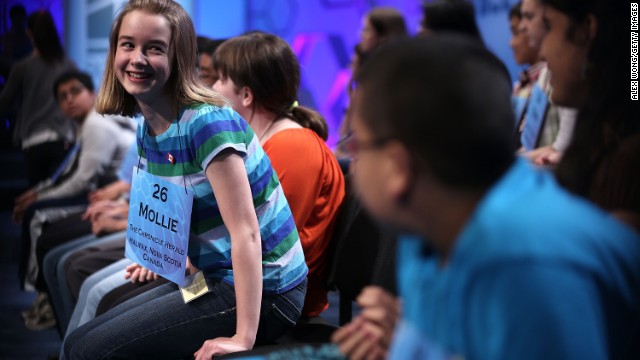 Mollie J. Symons of Halifax, Nova Scotia, Canada, returns to her seat after spelling "ombrology," a branch of meteorology dealing with rain, in round three on May 29.
Mollie J. Symons of Halifax, Nova Scotia, Canada, returns to her seat after spelling "ombrology," a branch of meteorology dealing with rain, in round three on May 29. 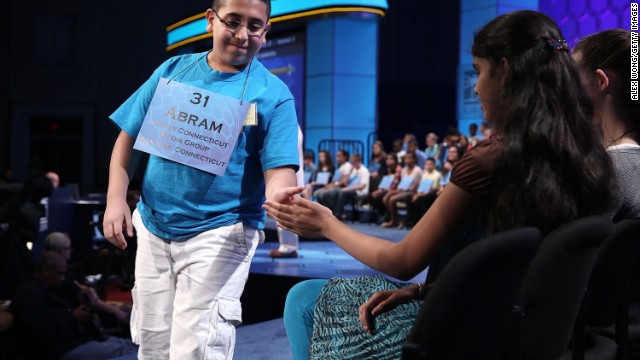 Abram Mikhaeel Goda, left, of Bridgeport, Connecticut, hi-fives Himanvi Kopuri of Denver, Colorado, after he spells "nomenclative," of or relating to name or the act of naming, in round three on May 29.
Abram Mikhaeel Goda, left, of Bridgeport, Connecticut, hi-fives Himanvi Kopuri of Denver, Colorado, after he spells "nomenclative," of or relating to name or the act of naming, in round three on May 29.  Zander Reed of Ankeny, Iowa, reaches to adjust the microphone before spelling "blottesque" in the third round on May 29. Blottesque means to be painted with blot-like brushwork.
Zander Reed of Ankeny, Iowa, reaches to adjust the microphone before spelling "blottesque" in the third round on May 29. Blottesque means to be painted with blot-like brushwork. 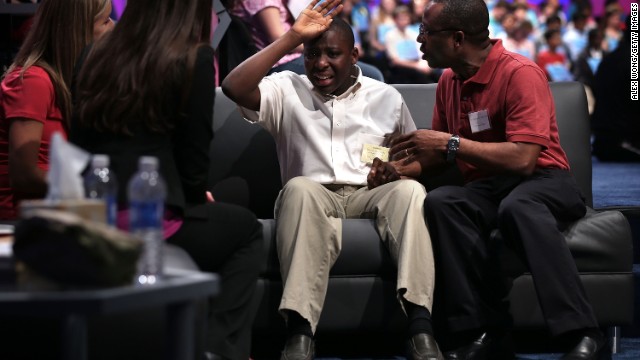 Eboseremhen Eigbe of Galloway, New Jersey, is comforted by his father after he misspelling the word "meiosis" during the third round on May 29. Meiosis is the complex nuclear process that results in the production of cells (as gametes) with half the number of chromosomes of the original cell.
Eboseremhen Eigbe of Galloway, New Jersey, is comforted by his father after he misspelling the word "meiosis" during the third round on May 29. Meiosis is the complex nuclear process that results in the production of cells (as gametes) with half the number of chromosomes of the original cell. 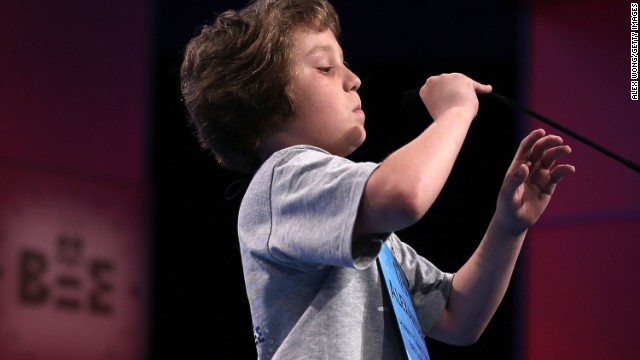 Alexander Schembra of Lillington, North Carolina, lowers the microphone before attempting, and failing, to spell "Beethovenian" during round three on May 29. Beethovenian is an adjective used to describe things that are related to or characteristic of Ludwig van Beethoven, his works or musical style.
Alexander Schembra of Lillington, North Carolina, lowers the microphone before attempting, and failing, to spell "Beethovenian" during round three on May 29. Beethovenian is an adjective used to describe things that are related to or characteristic of Ludwig van Beethoven, his works or musical style. 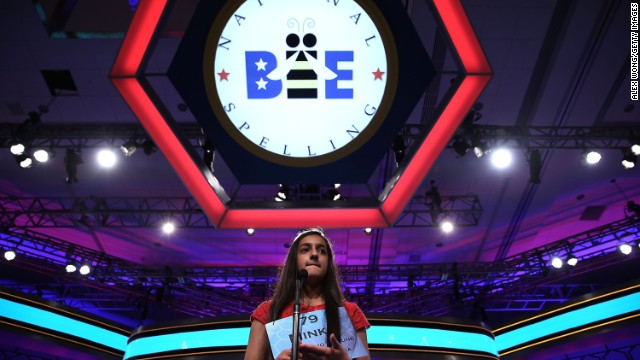 Minka Gill of Kokomo, Indiana, spells "corpuscle" during round two on May 29. A corpuscle mean a minute or elementary particle or a living cell that is isolated and not a continuous part of other tissue -- like a red or white blood cell.
Minka Gill of Kokomo, Indiana, spells "corpuscle" during round two on May 29. A corpuscle mean a minute or elementary particle or a living cell that is isolated and not a continuous part of other tissue -- like a red or white blood cell. 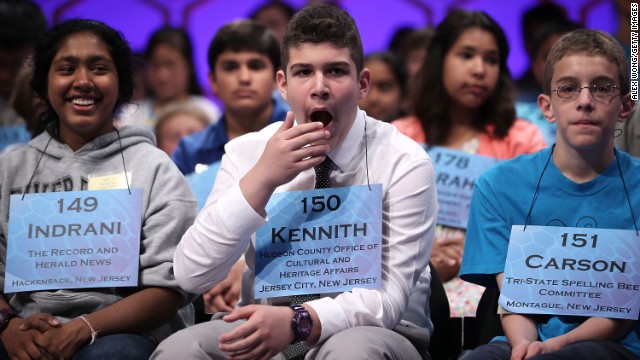 Kennith Gonzalez of Union City, New Jersey, yawns during round two on May 29. Kennith correctly spelled "tarragon." Tarragon is a European wormwood grown for it's aromatic foliage used in making pickles and vinegar.
Kennith Gonzalez of Union City, New Jersey, yawns during round two on May 29. Kennith correctly spelled "tarragon." Tarragon is a European wormwood grown for it's aromatic foliage used in making pickles and vinegar.  Mollie J. Symons of Halifax, Nova Scotia, Canada, smiles as she spells "charpoy" in the second round on May 29. A charpoy is a bed made of a frame strung with light rope or tape, typically found in India.
Mollie J. Symons of Halifax, Nova Scotia, Canada, smiles as she spells "charpoy" in the second round on May 29. A charpoy is a bed made of a frame strung with light rope or tape, typically found in India. 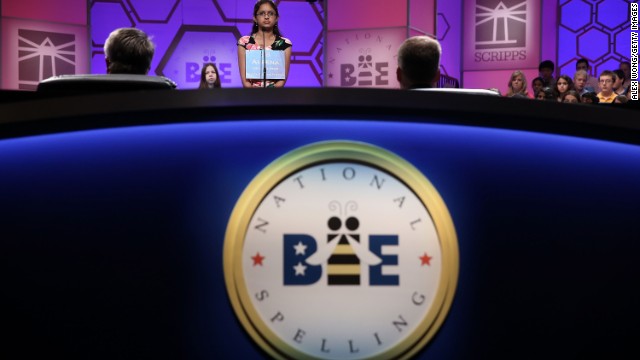 Aleena Boby, in front, of Fort Myers, Florida, spelled "galjoen," an African fish, and Grace Remmer, behind, of St. Augustine, Florida, spelled "repertoire," a set of skills, devices, or knowledge possessed by a person, on May 29.
Aleena Boby, in front, of Fort Myers, Florida, spelled "galjoen," an African fish, and Grace Remmer, behind, of St. Augustine, Florida, spelled "repertoire," a set of skills, devices, or knowledge possessed by a person, on May 29. 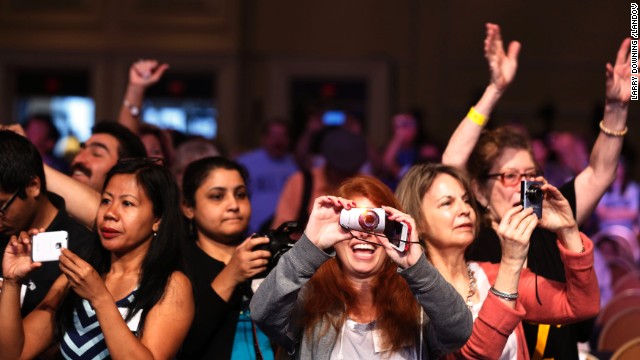 Parents wave to the competitors on May 29.
Parents wave to the competitors on May 29.  Katie Peterson of Palm Desert, California, concentrates as she spells "kirtle" on May 29. A kirtle is long tunic or coat-like garment.
Katie Peterson of Palm Desert, California, concentrates as she spells "kirtle" on May 29. A kirtle is long tunic or coat-like garment. 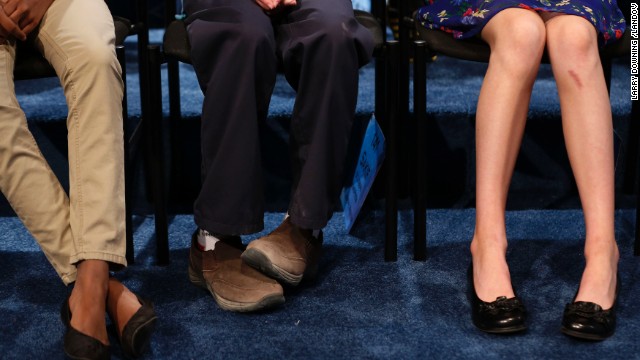 Spellers wait for their turn on May 29.
Spellers wait for their turn on May 29. 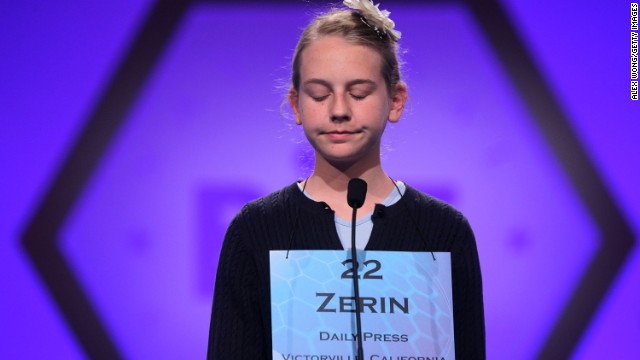 Zerin Wetzel of Fort Irwin, California, reacts as she fails to spell "commissar" on May 29. A commissar is most commonly defined as a Communist Party official responsible for teaching party principles and policies and ensuring party loyalty.
Zerin Wetzel of Fort Irwin, California, reacts as she fails to spell "commissar" on May 29. A commissar is most commonly defined as a Communist Party official responsible for teaching party principles and policies and ensuring party loyalty. 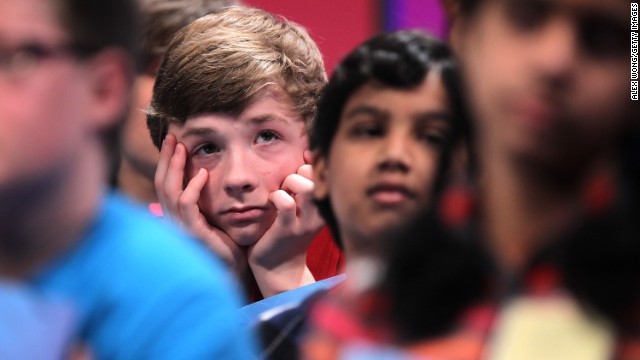 Lucas Michael Urbanski of Crystal Lake, Illinois, waits his turn on May 29. Urbanski later spelled "hartebeest," a large African antelope that was nearly exterminated.
Lucas Michael Urbanski of Crystal Lake, Illinois, waits his turn on May 29. Urbanski later spelled "hartebeest," a large African antelope that was nearly exterminated.  Giabao Tonthat of Escondido, California, spells "Qatari," a person living in Qatar, on May 29.
Giabao Tonthat of Escondido, California, spells "Qatari," a person living in Qatar, on May 29.  Vanya Shivashankar of Olathe, Kansas, younger sister of 2009 Bee champion Kavya Shivashankar, waits her turn on May 29. Shivashankar later spelled "intaglio," a figure or design created as an impression below the surface level of stone or similar material.
Vanya Shivashankar of Olathe, Kansas, younger sister of 2009 Bee champion Kavya Shivashankar, waits her turn on May 29. Shivashankar later spelled "intaglio," a figure or design created as an impression below the surface level of stone or similar material. 
1

2

3

4

5

6

7

8

9

10

11

12

13

14

15

16

17

18

19

20

21

22

23

24

25

26

27

28

29

30

31

32

33
 Photos: Scripps National Spelling Bee
Photos: Scripps National Spelling Bee 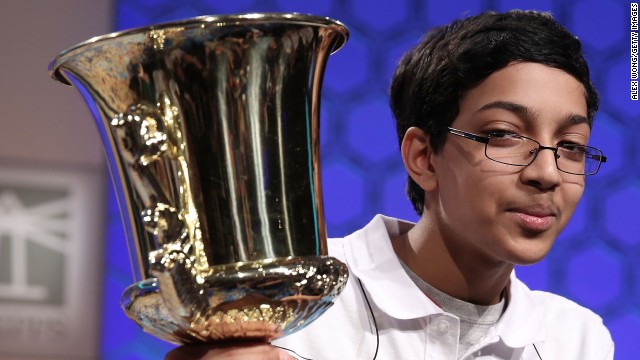 Arvind Mahankali won the 2013 Scripps National Spelling Bee after spelling "knaidel," which is a dumpling. Click through to see the rest of the winners from the past 15 years. The definitions of their winning words are from the Merriam-Webster dictionary. View photos from this year's spelling bee.
Arvind Mahankali won the 2013 Scripps National Spelling Bee after spelling "knaidel," which is a dumpling. Click through to see the rest of the winners from the past 15 years. The definitions of their winning words are from the Merriam-Webster dictionary. View photos from this year's spelling bee. 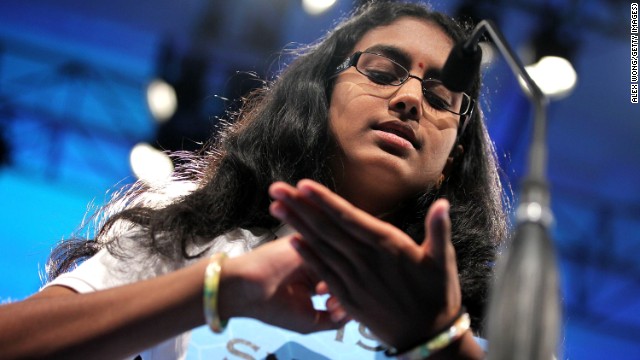 Snigdha Nandipati won in 2012 with the word "guetapens," which means an ambush.
Snigdha Nandipati won in 2012 with the word "guetapens," which means an ambush. 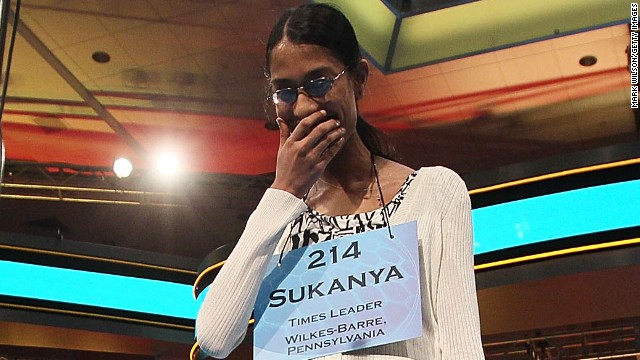 Sukanya Roy won in 2011 with the word "cymotrichous," an adjective that means "having the hair wavy."
Sukanya Roy won in 2011 with the word "cymotrichous," an adjective that means "having the hair wavy."  Anamika Veeramani won in 2010 with the word "stromuhr," which is an instrument that measures the amount and speed of blood flow through an artery.
Anamika Veeramani won in 2010 with the word "stromuhr," which is an instrument that measures the amount and speed of blood flow through an artery. 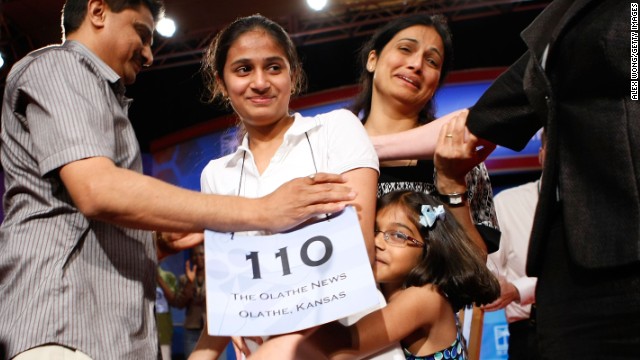 Kavya Shivashankar won in 2009 when she correctly spelled "laodicean," which means lukewarm or indifferent, particularly in matters of politics or religion.
Kavya Shivashankar won in 2009 when she correctly spelled "laodicean," which means lukewarm or indifferent, particularly in matters of politics or religion. 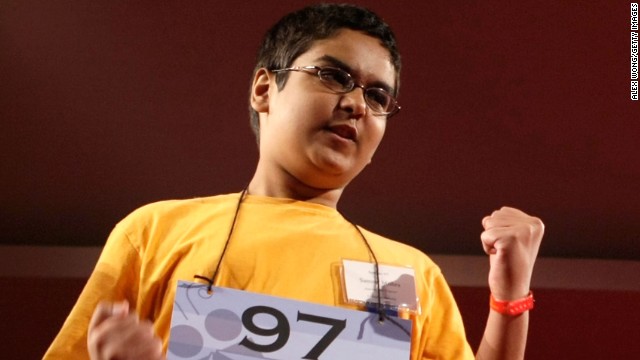 Sameer Mishra won in 2008 with the word "guerdon," which is a reward or recompense.
Sameer Mishra won in 2008 with the word "guerdon," which is a reward or recompense. 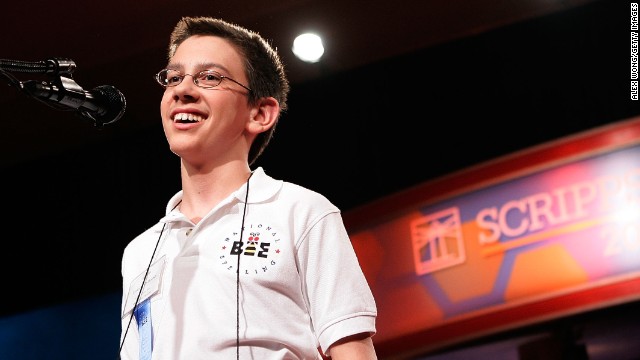 Evan O'Dorney won in 2007 with the word "serrefine," small forceps used for clamping a blood vessel.
Evan O'Dorney won in 2007 with the word "serrefine," small forceps used for clamping a blood vessel.  Katharine Close won in 2006 by correctly spelling "ursprache," a language that is reconstructed from evidence of later languages.
Katharine Close won in 2006 by correctly spelling "ursprache," a language that is reconstructed from evidence of later languages. 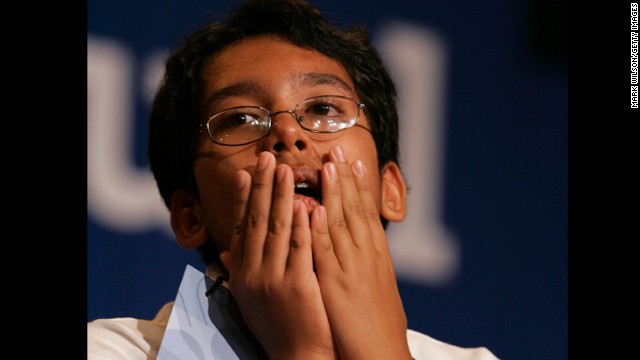 Anurag Kashyap won in 2005 with the word "appoggiatura," a smaller embellishing note or tone that precedes a melodic note or tone.
Anurag Kashyap won in 2005 with the word "appoggiatura," a smaller embellishing note or tone that precedes a melodic note or tone. 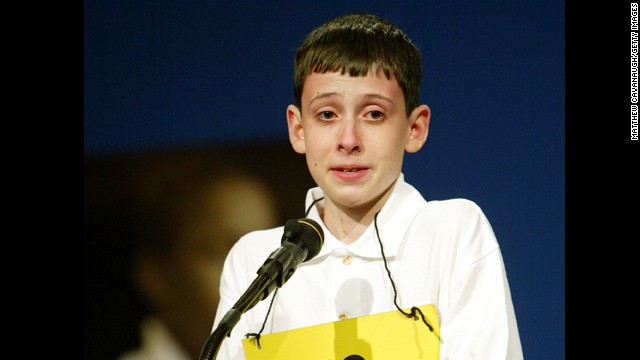 David Tidmarsh won in 2004 with the word "autochthonous," an adjective that means indigenous or native.
David Tidmarsh won in 2004 with the word "autochthonous," an adjective that means indigenous or native. 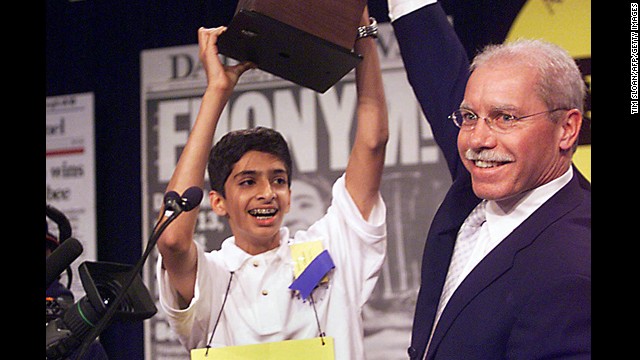 Sai R. Gunturi won in 2003 with the word "pococurante," meaning indifferent or nonchalant.
Sai R. Gunturi won in 2003 with the word "pococurante," meaning indifferent or nonchalant. 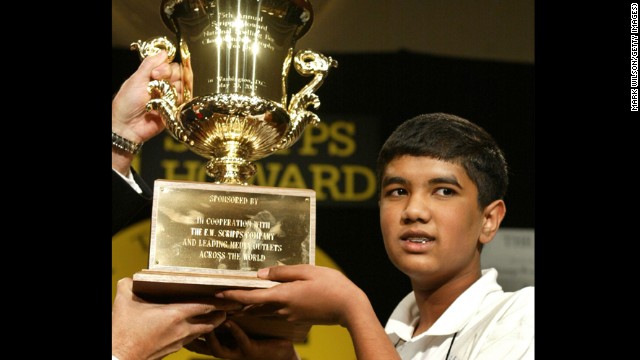 Pratyush Buddiga won in 2002 with the word "prospicience," which is the act of looking forward or having foresight.
Pratyush Buddiga won in 2002 with the word "prospicience," which is the act of looking forward or having foresight.  Sean Conley won in 2001 with "succedaneum," defined as "a substitute."
Sean Conley won in 2001 with "succedaneum," defined as "a substitute."  George Abraham Thampy won in 2000 with the French word "démarche," meaning a course of action, typically in politics.
George Abraham Thampy won in 2000 with the French word "démarche," meaning a course of action, typically in politics. 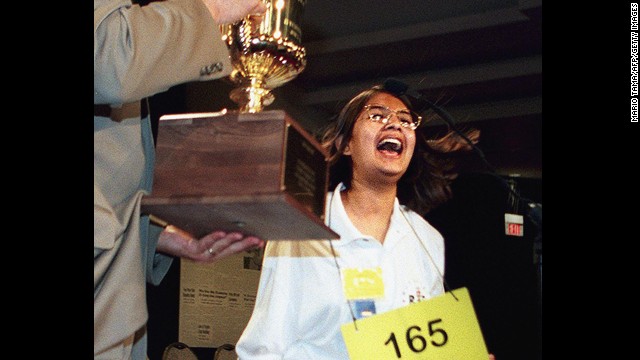 Nupur Lala won in 1999 with the word "logorrhea," meaning excessive and incoherent talkativeness or wordiness.
Nupur Lala won in 1999 with the word "logorrhea," meaning excessive and incoherent talkativeness or wordiness. 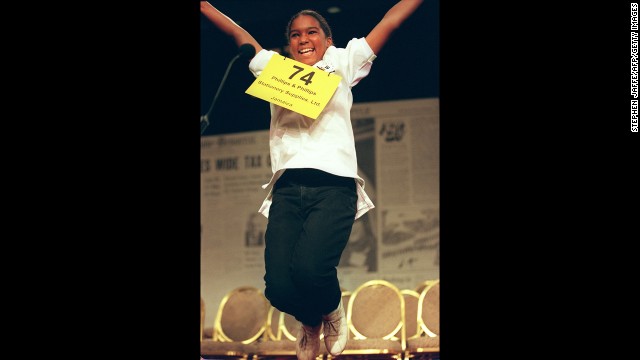 Jody-Anne Maxwell won in 1998 after correctly spelling "chiaroscurist," which is an artist who specializes in chiaroscuro, or contrasting the effects of light and shade in a work of art.
Jody-Anne Maxwell won in 1998 after correctly spelling "chiaroscurist," which is an artist who specializes in chiaroscuro, or contrasting the effects of light and shade in a work of art. 
1

2

3

4

5

6

7

8

9

10

11

12

13

14

15

16
 National Spelling Bee champions
National Spelling Bee champions  Changes coming to spelling bee
Changes coming to spelling bee "I thought that the German curse had turned into a German blessing," he said, when asked what he thought when he heard the final word, a German-derived Yiddish word for a type of dumpling.
Pranav Sivakumar, a 13-year-old from Tower Lakes, Illinois, finished second. He missed on "cyanophycean" before Mahankali nailed "tokonoma" and "knaidel" for the victory.
The annual contest offers the winner a healthy dose of classroom cred, $32,500 in cash and savings bonds, a trophy and a library of reference materials.
Contest isn't bee-all and end-all
Eleven million schoolchildren participated in preliminaries leading up to the national contest this week. Of those, 281 children made the trip to Oxon Hill, Maryland, just outside Washington, for the national bee. Eleven spellers made it through to the finals.
Among them were 63 children who had been to at least one national bee before, and had to prepare for some changes in the rules for this year's events.
For the first time, participants had to demonstrate proficiency in vocabulary in addition to spelling.
Organizers also added an additional computer test for the semifinals, imposed time limits on computer-based spelling and vocabulary tests and added a rule that resulted in automatic elimination for any participant who misspelled a word on stage in the second or third rounds.
CNN's Athena Jones and Michael Pearson contributed to this report.